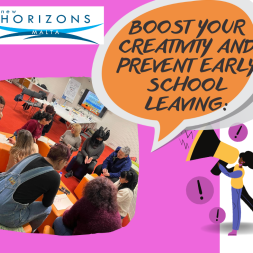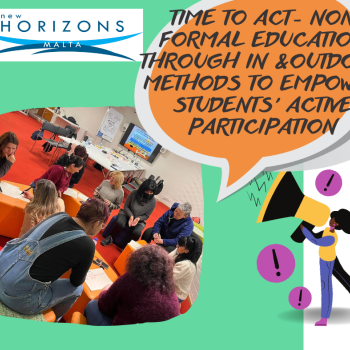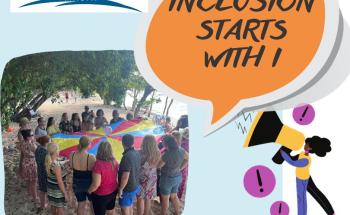
Third-party on-site course
BOOST YOUR CREATIVITY AND PREVENT EARLY SCHOOL LEAVING: STEPS FOR INTEGRATION AND INTERCULTURAL EDUCATION
The course provides participants with an overview of the trending innovative teaching methods as well as a cooperative, inspirational and stimulating space where to experiment and practice new tools, strategies and approaches.
8 training days format but at your request, the course can be structured for a shorter format of 7,6, or 5 days
course fee 80 eur/day/participant
12.04.2024
Next upcoming session:
20.05.2024
- 27.05.2024
Multiple locations
Description
The programme is designed on learning modules. The detailed agenda will be given after pre-registration.
1 .INTERCULTURAL SETTINGS. Connection between culture and inclusion. Multicultural or intercultural education. Show me your class and I will tell you who you are
2 INTRODUCTION TO INCLUSION. A clear, basic understanding of exclusion and inclusion. Aims and objectives of inclusive education. What means a teacher as inclusive promoter?
3. CREATIVITY: EU ley competences; creative solutions through creative learning methods. COLB method for creative teachers. Creativity and Making – crucial ideas for effective inclusion strategy
4. CREATIVE DRAMA IN EDUCATION: Effective Communication through Drama . Drama in Education -ideas to prevent early school leaving
5.THE VALUE OF INCLUSIVE EDUCATION: The basic elements of inclusive education; The support of inclusive education; Human library and Digital Storytelling as educational tools;
6. STRATEGIES TO EARLY SCHOOL LEAVING AND PREVENT EXCLUSION. How to foster students’ inclusion, tolerance and intercultural awareness through non-formal, informal and experiential learning activities. Non formal education tools aimed
at social inclusion. Designing lessons and activities to support increasing diversity in contemporary classrooms.
7.The extra benefit of using NON FORMAL METHODS IN MULTICULTURAL ENVIRONMENT. Practical work: designing,preparing and implementing engaging non-formal activities.How to use technology and game-based education to make
teaching more interactive. Practical work: creating and delivering interactive learning games
8. TECHNIQUES TO SUPPORT SOCIAL INCLUSION. Conflict in classroom. Management styles of conflict.. Space for discussion of future cooperation and planning follow up activitiesCourse evaluation. Releasing of official course certifications.
All our courses includes at least one VISIT TO LOCAL SCHOOL and the opportunity to interact with LOCAL TEACHERS
Learning objectives
The course will empower teachers with skills and
knowledge about access of students with fewer opportunities to formal and non-formal education, transnational mobility and participation, active citizenship, strategies to prevent early school leaving and tools to promote the differences in society.
By the end of the course, each participant should be able to:
-to solve inclusion issues in multicultural classes
-to have a clear understanding of exclusion and inclusion
- to create a pedagogical strategies in order to prevent early school leaving in his/ her school unit
-to find solutions and take measures to avoid exclusion of young people with fewer opportunities
-to use a wide range of idea creation techniques to create new and worthwhile ideas;
-to develop communication, collaboration, presentation, problem solving, negotiation, critical and creative thinking skills
-to learn strategies for students with fewer opportunities so as to give access them to formal and non-formal
education for empowerment and inclusion in school and society
-to know and to apply creative drama intercultural techiques and European dimension
-to plan for and design inclusive education environments for learning.
-to develop individual learning plans based on whole-school curriculum planning.
-to outline strategies for developing professional working relationships within this group.
-to select and use relevant curriculum and support resources
-to learn new non-formal education activities and techniques in order to better integrate of all students in the classroom
- to use new mediation and negotiation tools in the fight against exclusion of students with fewer opportunities
-to exchange practices and experiences on various aspects and perceptions of marginalization , inclusion and early school leaving
if your project is already approved enroll here: NEW HORIZONS MALTA Erasmus sessions 2023/2024 (google.com)
Methodology & assessment
Based on formal, informal and non formal learning, our methodology stimulates active participation, pro-activity, responsibility and sharing thoughts of all participants involved.t has a horizontal and practical approach and will make use of the following tools:face-to-face lessons, study visits in inclusive centres,team-building and team-working, experiential learning, best practice case-studies, project working,driven simulations,role-play, study visits, focus-group, daily evaluation through self, group assessment, etc. We focus on learning by doing and active cooperation instead of theoretical input.
Certification details
At the end of the course, each participant will be awarded with the Europass Mobility Certificate, together with a descriptive certificate of attendance ( on the certificate will be specified the title of the course, name of the participant project, national reference number, numbers of hours, course dates and location). after participants enrollment, we provide also the learning agreement and the interinstitutional agreement. PREPARATION AND FOLLOW UP BEFORE:Every participant will have to fill a questionnaire which helps the trainers to customize the course to better fit their needs. Attendants will get instructions and material which will help them to be prepared for the courses needs. AFTER: The participants will get material which includes information about all the areas covered at the course, lesson plans , all the produced outcomes of the course, useful links and more. ON THE LAST DAY OF THE COURSE THE PARTICIPANTS WILL HAVE THE OPPORTUNITY TO CREATE A DRAFT OF FUTURE ERAMUS SMALL SCALE PROJECT AND DESIGN SUPPORT WILL BE GIVEN
Viðbótarupplýsingar
-
Language:English
-
Target audience ISCED:Lower secondary education (ISCED 2)Upper secondary education (ISCED 3)Other
-
Target audience type:TeacherHead Teacher / PrincipalCompany staff
-
Learning time:25 hours or more
Upcoming sessions
More courses by this organiser

On-site
TIME TO ACT- NON FORMAL EDUCATION THROUGH IN &OUTDOOR METHODS TO EMPOWER STUDENTS ACTIVE PARTICIPATION
Next upcoming session
-
Multiple locations
Organisation picture
Organised by
New Horizons Malta

On-site
Inclusion starts with I – Learning to live together
Next upcoming session
-
Multiple locations
Organisation picture
Organised by
New Horizons Malta

On-site
Inclusion starts with I – Learning to live together- St Tropez- France/ Bari- Italy/ Lisbon-Portugal
Next upcoming session
-
Multiple locations
Organisation picture
Organised by
New Horizons Malta

